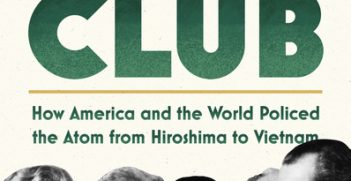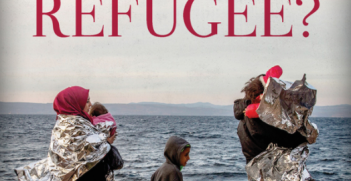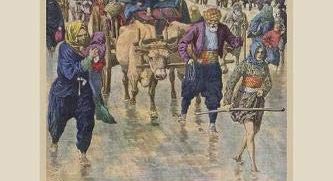Reading Room: Return to Moscow

Given Russia’s return to the world stage in the Caucasus, in Ukraine and in Syria, plus the allegations of involvement in Trump’s election victory, it is timely to have a new analysis of Putin’s Russia. Tony Kevin, a former Australian diplomat, has written an interesting book, part political defence of Putin and part travelogue, reflecting on a trip back to Russia after a 40-year absence.
Kevin provides a useful corrective to some of the more hawkish views on Russia. He rightly casts a critical eye over the interventions of Western ‘do-gooders’ but his reluctance to remove his rose-tinted spectacles about the current occupant of the Kremlin is a running weakness throughout the book. Putin, we are told, had a “harsh and deprived childhood”, as if this were an excuse for the nature of his regime. According to the author, it was the West that provoked Putin into invading Georgia, annexing Crimea, arming the separatists in eastern Ukraine and bombing Aleppo.
Kevin trots out the Kremlin’s standard line that there was a Western plot to weaken Russia after the end of the Cold War. As the reviewer was closely involved in Western policy during this period, he can categorically deny such claims. Western officials were too preoccupied with a host of problems—including the first Gulf War, the bloody disintegration of the Balkans, the reunification of Germany and the Maastricht treaty—to have time to devise dastardly plans for Russia.
The author lambasts NATO enlargement without asking the basic question as to whether the East Europeans, having regained their freedom after four decades of Soviet rule, should not have the right to choose their own friends and alliances. Rather he argues that as a great power that has been invaded in the past, Russia should have its own sphere of influence in its neighbourhood.
There are some realist scholars of international relations, including John Mearsheimer and Stephen Cohen, who support this line. They argue that as Ukraine and other East European states are not in the national interest of the US, it really does not matter who controls them. This theory is soundly rebutted by all governments in the region as well as NATO and its member states. There were fears during the Trump campaign that a Trump victory might lead to US acceptance of Russia’s droit de regard over the region. NATO was deemed ‘obsolete’ while Newt Gingrich, a prominent Republican, famously called Estonia “a suburb of St Petersburg”.
Now the mounting evidence of Russian interference in US politics has led to a U-turn. The cosying up to Putin has been replaced by a toxic brand. At the 2017 Munich security conference the US establishment, including Vice-President Pence, Pentagon chief Mattis, Secretary of State Tillerson and Senator McCain, lined up to berate Russia and reaffirm US support for NATO. Trump lost Michael Flynn, his first national security advisor, who lied about his links to Russia.
Kevin is right that the West should seek to maintain contact with Russia—but not at any price. It is important for its own moral compass that the West continues to offer support for the brave band of democracy and human rights activists in Russia, a group strangely missing from Kevin’s narrative. Russia, with a GDP the size of Spain or Italy, is not a major economic actor. If it disappeared tomorrow the world’s economy would barely notice.
Kevin describes the relentless Russian media campaign against the West as “defensive” while ignoring the mounting evidence of Russia’s interventions in Western democracies. Despite his unchallenged monopoly of power, history will judge Putin harshly for failing to modernise the Russian economy despite the oil price being sky high for most of his extended presidency.
Kevin’s disingenuous defence of Putin covers half the book. The rest is a mix of memory lane, travelogue and his favourite Russian authors, including Pasternak and Tolstoy. Kevin was a junior diplomat in Moscow from 1969-71 and recounts the difficulties of operating in the Soviet capital. He had no Russian friends and, like many diplomatic missions, the Australian embassy had very limited contacts with Soviet officials; they had to rely on their Anglo-Saxon partners for insights. Oddly, there is a lengthy defence of Laurie Matheson, a senior Australian trade official serving with Kevin, and who was later caught up in a spy affair involving a Labor politician and the KGB.
Kevin not only tells some interesting tales about diplomatic life in Moscow under Brezhnev but he has a keen and sympathetic eye for the daily travails of Russians then and today. Having revisited Russia in 2016 (hence the title of the book) Kevin argues that despite the difficult living conditions, worsened due to Western sanctions, the Russians are a proud and cultured people with a sense of history and their place in the world. He does not mention, however, the recent state-approved revival of the cult of Stalinism.
The West, he concludes, should adopt a more conciliatory approach towards Russia. This, however, could only be done by giving up some fundamental Western principles including respect for the territorial integrity of states (Ukraine, Georgia, Moldova and others) and human rights. Putin has shown little interest in any deal with the West unless the Russian sphere of influence is explicitly recognised. Even with Trump in the White House, possibly assisted by Putin, the West simply cannot do this.
We are thus in for a long haul as Putin can legitimately remain president until 2024. The West will need plenty of strategic patience during this period. It should work with Russia wherever possible (arms control, terrorism, Middle East, Iran) but only drop sanctions and allow Russian back into the G8 as and when the Minsk agreements covering Ukraine are fully implemented.
There is much to savour in Kevin’s book. He is an avowed Russophile with a fluent pen and an eye for detail. But the next time he visits Russia, he should remove those spectacles.
Tony Kevin, Return to Moscow, Crawley: UWA Publishing, March 2017.
Fraser Cameron is Director of the EU-Russia Centre in Brussels.
Watch the recent Australian Outlook interview with Tony Kevin regarding ‘Return to Moscow’.





